Support for innovative teaching methods in EU Criminal Law
Awarded in September 2020, for a period of three years, the Jean Monnet Module EU-Clinic (620929-EPP-1-2020-1-BE-EPPJMO-MODULE) supports several innovative teaching activities in EU Criminal Law. In this way, it contributes to the dissemination of knowledge in a rapidly expanding area of EU law that is still under-integrated into higher education and training curricula.
The support provided by the Jean Monnet Module is more broadly intended to contribute to the University’s ability to provide a specialized curriculum in EUCriminal Law and stimulate interest for this fast-developing EU policy area. As one of the key objectives supported by the project, young researchers will be given the opportunity to develop their teaching experience by directly taking part in the specialised course and the Clinic(“training to teach”).The JeanMonnet Module EU Clinic also represents a further step in supporting the professionalization of EU studies. It will improve the quality of academic training in a field of interest to students, academics and practitioners, and it will equip students with the necessary skills to enhance their competitiveness on the professional market in EU law.
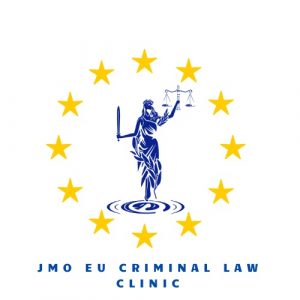

 The project’s principal coordinator is Prof. Anne Weyembergh, who has an extensive and renowned academic expertise in EU Criminal Law. Prof. Weyembergh is Professor at the Université libre de Bruxelles (ULB) and Vice-Dean for international relations of the Law Faculty. She founded and co-coordinates the European Criminal Law Academic Network (ECLAN) since November 2004. Based on her extensive experience, including the leadership role she assumes in various University and EU funded projects, Anne Weyembergh is responsible for the direction and the coordination of the module.
The project’s principal coordinator is Prof. Anne Weyembergh, who has an extensive and renowned academic expertise in EU Criminal Law. Prof. Weyembergh is Professor at the Université libre de Bruxelles (ULB) and Vice-Dean for international relations of the Law Faculty. She founded and co-coordinates the European Criminal Law Academic Network (ECLAN) since November 2004. Based on her extensive experience, including the leadership role she assumes in various University and EU funded projects, Anne Weyembergh is responsible for the direction and the coordination of the module.
Key participants
The specialised course on “EU Criminal Law” is taught primarily by Prof. Anne Weyembergh in collaboration with Gilles de Kerchove, former EU counter-terrorism coordinator. In order to make the course dynamic and give young researchers the opportunity to develop their teaching experience, several doctoral and post-doctoral researchers have been invited to take part in this course as substitute or guest speakers. They include Dr. Mona Giacometti, François Catteau and Dr. Julia Burchett.
The negotiation exercise is conducted by Serge de Biolley, giving students the opportunity to benefit from his vast expertise as a Belgian negotiator of EU Criminal Law instruments.
As part of the EU Criminal Law Clinic, students carry out their work under the supervision of a team composed of Prof. Anne Weyembergh, Me. Maryse Alié (lawyer at the Brussels bar), Dr. Julia Burchett (post-doctoral researcher) and Ali Bounjoua (PhD candidate).
Main activities
Involving several academics affiliated with the Institute, national practitioners and senior EU officials, the Jean Monnet Module EU-Clinic aims to develop an innovative and holistic approach to teaching EU Criminal Law. The module covers three main activities:
A course on “EU Criminal Law”
The objective of this 24-hour yearly course for Master’s students is to provide a comprehensive overview on the functioning of police and judicial cooperation in criminal matters in the EU. It deals with the “internal” dimension of EU Criminal Law, but also its “external” dimension, in particular EU cooperation with third countries and third party organizations.
After a general introduction, the course will be divided into five distinct parts, icnluding: Decisional process and other institutional aspects (I); Mechanisms for cooperation, including its actors (judicial co-operation in criminal matters and police cooperation) (II); Approximation of laws (substantive and procedural criminal law) (III); A sectorial approach – the case of terrorism (IV); And finally, external relations with a focus on terrorism as well (V).
An EU Criminal Law Clinic
The clinic is a space in which students collaborate with criminal lawyers and practitioners in the preparation of concrete cases, open to a limited number of Master students (25 students maximum – 24h/year). The Clinic usually starts with a first introductory session during which the students are given theoretical and methodological instructions so that they are sufficiently equipped to undertake their work. At the end of this session, the participating students are divided into small groups of 2-3 students, each responsible for a practical case submitted by a practitioner.
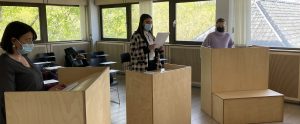
A negotiation exercise
Open to a limited number of students enrolled in the LL.M in EU law, this 12-hour yearly seminar is designed to complement the theoretical course on EU Criminal Law by enabling students to familiarise themselves with professional practice in this field.
The main part of the seminar is dedicated to a negotiation exercise where students receive a fictious legislative proposal, and are attributed roles and instructions as negotiators (e.g. as representative of the Presidency of the Presidency of the Council of the EU, the European Commission and Member States).
At the end of this seminar, students will have acquired a sound knowledge of the inter-institutional dynamics involved in the negotiation of EU Criminal Law instruments.”
The EU-Clinic Pack
As one of the main contributions of the project, the EU-Clinic pack provides didactic material for academics wishing to develop similar EU Criminal Law Clinics within their universities.
Our EU-Clinic aims to integrate a practical dimension into legal studies by allowing Master students to learn about the requirements of the professional world. During this experience, students will have the opportunity to work on real cases alongside practitioners (lawyers, NGOs) with a dual mastery of national criminal law and European criminal law under the supervision of a team of experienced researchers. The EU Criminal Law Clinic represents a unique opportunity for students to put their knowledge at the service of fundamental issues for rights and freedoms. It is also a source of intellectual enrichment for the practitioners and researchers who assist students within the framework of this project.
Through an innovative approach, combining educational activities (study trips in the Hague or Luxembourg) and practical scenarios, the EU Criminal Law Clinic aims to be a rewarding and challenging experience to a better knowledge of the European criminal law and the concrete issues surrounding it. By working to improve knowledge in a booming area and still poorly mastered by many legal professionals, the EU Criminal Law Clinic hopes to open new professionals horizons to students.
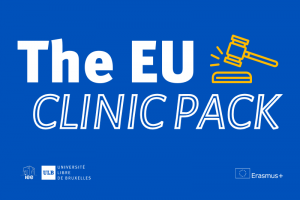
A syllabus containing all relevant information needed for the setting up of a clinic (programme and objectives, teaching and evaluation methods used, best practices and challenges encountered, coordination of partners, etc.) will be available shortly!
Highlights of the project
- The EU Criminal Law Clinic
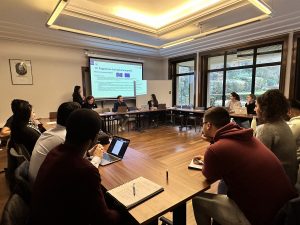
2021
The second edition of the Clinic was launched on 15 February 2021, with 22 students registered. This year, the Clinic received nine practical cases submitted by seven practitioners (lawyers and members of NGOs), which were distributed among the student groups. The cases submitted dealt with a range of issues, including the European Arrest Warrant (EAW), access to a lawyer or the ne bis in idem principle.
2022
For its third edition (2022), the EU Criminal Law Clinic had twenty-six students enrolled. The Clinic handled eight legal cases submitted by six practitioners, extending its collaboration to four new practitioners. The cases submitted covered a range of topics, each linked to EU criminal law, such as the European Arrest Warrant, the presumption of innocence, the extradition of EU citizens or the impact of the case-law Quadrature du Net on admissibility of evidence in Belgian law, to name but a few.
2023
The fourth edition (2023) of the Clinic kicked off on 6 February 2023 with an introductory session, during which the supervisory team and students introduced themselves. This was an opportunity to deliver tailor made theoretical and methodological reminders to students and to present them the theme of the practical cases submitted by practitioners. The six cases submitted covered a range of topics relating to EU criminal law, including the right of access to the case file in criminal proceedings, mutual recognition of driving disqualifications, prison conditions or the transfer of sentenced persons just to name the main ones.
- Study Trips to the Court of Justice
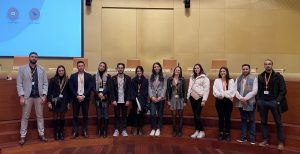
2021: cancellation of the visit to the Court of Justice due to the Covid-19 pandemic.
2022: Thanks to the lifting of Covid-19 restrictions, a study trip to the Court of Justice of the European Union was organized on 26 April 2022. At this occasion, the students attended a hearing on an extradition case (Case C- 237/21 Generalstaatsanwaltschaft München) which was preceded by an explanation of the case by the référendaire, Ms Chiara Ricci. The hearing was followed by a lunch in the presence of the judge Lars Bay Larsen in charge of the case, giving students the opportunity to ask questions.
2023: On 27 February 2023, the students participating in the EU Criminal Law Clinic had the opportunity to go on a study trip to the CJEU in Luxembourg! On this occasion, the students attended a ground-breaking hearing concerning the very first case brought before the Court on the European Public Prosecutor’s Office (Case C-281/22 G.K.e.a.). This was followed by a debriefing with the judge rapporteur in charge of the case, M. Lars Bay Larsen.
- Final Oral Presentation
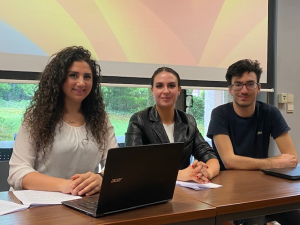
3 May 2021: The Clinic’s final oral presentation session took place in the Popelin auditorium! This was an opportunity for students to showcase their research by putting themselves in the shoes of real professionals.
9 May 2022: The last session of the third edition of the Clinic closed with an oral presentation in person, followed by a discussion with the students participating in the clinic, the supervising team and the practitioners in charge of the case. On this occasion, two former students were invited to share their views on what they have learned from the clinic and how they were able to take advantage of this experience in their job search.
15 May 2023: The final session of the fourth edition of the Clinic ended on 15 May with an oral presentation during which the students presented the results of their work to the other students participating in the clinic, the supervising team and the practitioners involved. This final session was followed by a discussion with one alumnus.


